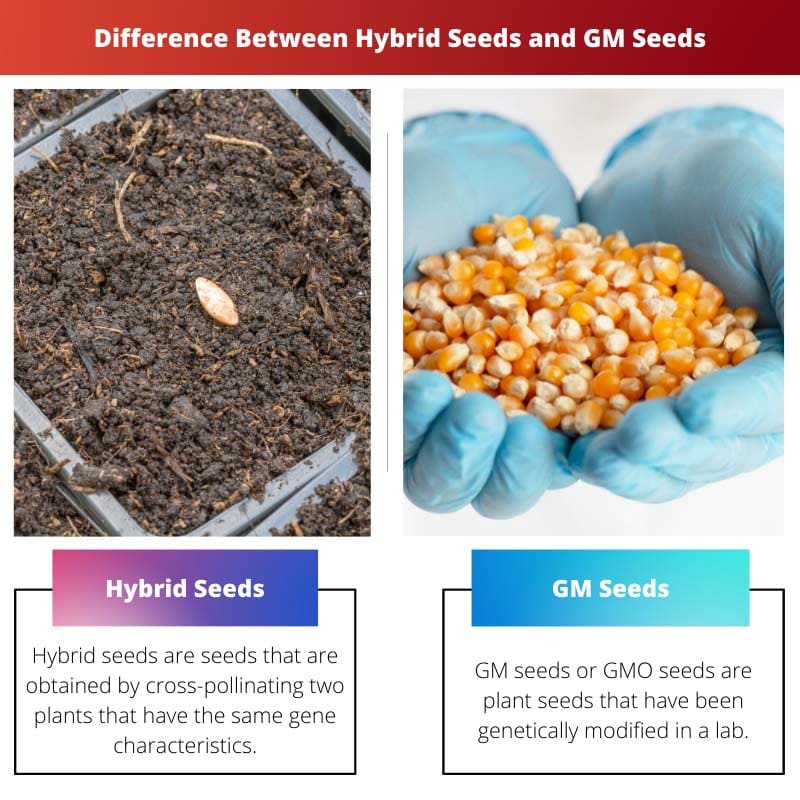Agriculture has been around since the beginning of mankind. Humans have been cultivating different types of plants for a very long time now.
Key Takeaways
- Hybrid seeds result from the cross-pollination of two different plant varieties, while GM seeds undergo genetic modification in a lab.
- Hybrid plants display the natural traits of both parent plants, but GM plants may contain genes from unrelated species.
- Hybrid seeds can’t reproduce consistently, while GM seeds can be patented and regulated.
Hybrid Seeds vs GM Seeds
Hybrid seeds are seeds that are created by naturally cross-pollinating two plants that are related to each other, causing the seeds to have the genetic qualities of both plants. GM or GMO seeds are genetically modified seeds which are made in the lab by genetically creating their gene patterns.

Hybrid seeds are obtained by naturally cross-pollinating two plants that are related to each other. The results of this cross-pollination are seeds that have the genetic qualities of both plants.
GM seeds, or GMO seeds, as the name suggests, are genetically modified seeds. These seeds are created in labs by genetically engineering the gene patterns of the seeds.
Comparison Table
| Parameters of Comparison | Hybrid Seeds | GM Seeds |
|---|---|---|
| Definition | Hybrid seeds are obtained by naturally cross-breeding two genetically similar plants | GM seeds are obtained by genetically engineering the gene pattern of plants in a lab |
| Objective | Cross-pollination is performed to obtain seeds with qualities of both the plants being pollinated | Genetic modification is conducted to create stronger, healthier, and more profitable seeds |
| Process type | It is a natural process | It is an artificial process |
| origin | Hybrid seed production has been around since the second half of the 20th century | Genetic modification is a relatively newer approach |
| Implementation | It is not a costly process and can be implemented easily | It is an expensive process and requires sophisticated labs for successful modification |
What is Hybrid Seeds?
Hybrid seeds are seeds that are obtained by cross-pollinating two plants that have the same gene characteristics. The cross-breeding results in seeds that have the qualities of both plants.
Hybridization has been around since the second half of the 20th century. Scientists Darwin and Mendel, in the mid-19th century, produced plant varieties that were stronger and healthier by cross-breeding plants naturally.
Since then, cross-breeding has been a staple practice among seed manufacturers to produce seeds that can adapt better to the changing environmental conditions of farms around the world.
Stronger growth, health, better infection resistance against insects, and greater yields are some of the benefits of using hybrid seeds. Hybrid seeds are used by local farmers and small-scale farming institutions.

What is GM Seeds?
GM seeds or GMO seeds are plant seeds that have been genetically modified in a lab. Genetic modification is the process of changing the gene pattern of an organism to inculcate different traits in the organism.
Genetically modified seeds are created by performing genetic engineering on the plants. Genetic engineering is the process of modifying the gene pattern of plants by selectively discarding some genes and saving other genes.
Gene splicing is one of the processes that are performed while modifying genes. The genes that are discarded are the genes that result in traits that are not wanted in plants.
Genetic modification is a comparatively newer approach to farming, and it requires sophisticated labs and environments for successfully creating genetically modified seeds.

Main Differences Between Hybrid Seeds and GM Seeds
- Hybrid seed production began in the mid-20th century. Genetic modification of seeds is a relatively newer process.
- Hybridization is not an expensive process and can be performed locally. Genetic modification is an expensive process, and sophisticated labs are required.

- https://www.tandfonline.com/doi/abs/10.1080/03768350500044065
- http://tru.uni-sz.bg/tsj/N%201,%20Vol.12,%202014/F.Narsi.pdf
- https://www.nature.com/articles/nbt0701_613a
- https://www.sciencedirect.com/science/article/pii/S157495411400048X